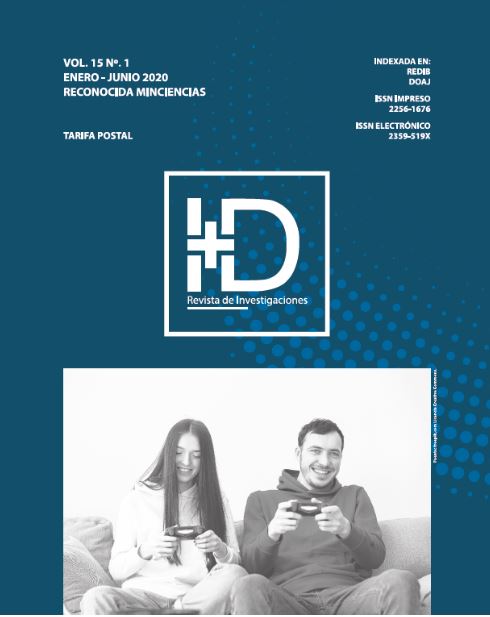Entrepreneurial initiative of the inactive human resource in the Penitentiary Establishment of Medium Security and Prison of Bucaramanga
DOI:
https://doi.org/10.33304/revinv.v15n1-2020006Keywords:
Entrepreneurial intention, inactive human resource, prisoner, penitentiaryAbstract
The Colombian prison code is regulated by Law 65 of 1993, which establishes that the functions and purposes of punishment in Colombia are protective and preventive, but its fundamental purpose is the resocialization. Currently, there is a penitentiary and prison crisis in the process of resocialization to the working life of the prisoner, due to their condition as ex-convicts. This research is an analysis of inactive human resources, the personal characteristics, environment, and influence on the entrepreneurial initiative in the Penitentiary Establishment of Bucaramanga, in order to propose strategies that favor the resocialization of this vulnerable population. The study has a non-experimental, quantitative, cross-sectional approach of relational scope. It was verified that the personal characteristics and the environment have a positive influence on the prisoner entrepreneur initiative, whereby the creation of an entrepreneurship unit in the Penitentiary Establishment is proposed.Downloads
References
Arias, G. E. (2019). Políticas de resocialización en el sistema carcelario en Colombia en el periodo 2015 al 2017. Recuperado de https://repository.ucatolica.edu.co/handle/10983/23249
Baron, R. A. (1998). Cognitive mechanisms in entrepreneurship: why and when entrepreneurs think differently than other people. Journal of Business Venturing, 13(4), 275–294. https://doi.org/10.1016/S0883-9026(97)00031-1
Bruno, A. V., & Tyebjee, T. T. (1982). The environment for entrepreneurship. In Encyclopedia of entrepreneurship 2 (Vol. 2, pp. 288–315). C. A. Kent, D. L. Sexton, & K. H. Vesper (Eds.). Englewood Cliffs, NJ: Prentice-Hell.
Capelleras, J., & Genescá, E. (2003). Formación y empleo por cuenta propia: Un análisis comparativo a nivel internacional. Creación de empresas: homenaje al profesor José María Veciana Vergés. Servei de Publicacions.
Chirinos, Y., Meriño, V., & Martinez, C. (2018). Emprendimiento sostenible: una opción para el crecimiento local. I+ D Revista de Investigaciones, 11(1), 116–128. https://doi.org/10.33304/revinv.v11n1-2018009
Congreso de Colombia. Código Penitenciario y Carcelario. Ley 65 de 1993, artículo 10 (1993).
Cuervo, A. (2005). Individual environmental determinants of entrepreneurship. International Entrepreneurship and Management Journal, 1(3), 293–311.
Deakins, D., & Whittam, G. (2000). Business start-up: theory, practice and policy. Enterprise and Small Business Principles, Practice and Policy, 115–131.
Díez-Cuervo, A., Muñoz-Yunta, J. A., Fuentes-Biggi, J., Canal-Bedia, R., Idiazábal-Aletxa, M. A., Ferrari-Arroyo, M. J., … Artigas-Pallarés, J. (2005). Guía de buena práctica para el diagnóstico de los trastornos del espectro autista. Revista de Neurología, 41(5), 299–310.
Franco, M., & Prata, M. (2019). Influence of the individual characteristics and personality traits of the founder on the performance of family SMEs. European Journal of International Management, 13(1), 41–68.
Frank, H., Lueger, M., & Korunka, C. (2007). The significance of personality in business start-up intentions, start-up realization and business success. Entrepreneurship & Regional Development, 19(3), 227–251.
Hernández, R., Fernández, C., & Baptista, P. (2006). Metodología de la investigación (Vol. 4). México.
Iruarrizaga, J. H., & Mendialdua, A. B. (2014). Financiación del proceso emprendedor. Ediciones Pirámide.
Jack, S., Drakopoulou, S., & Anderson, A. (2008). Cange and the development of entrepreneurial networks over time: a processual perspective. Entrepreneurship & Regional Development, 20(2), 125–159. https://doi.org/10.1080/08985620701645027
Keeble, D., Bryson, J., & Wood, P. (1993). Business networks, small firm flexibility and regional development in UK business services. Entrepreneurship & Regional Development, 5(3), 265–278. https://doi.org/10.1080/08985629300000016
Kirzner, I. M. (1973). Competition and Entrepreneurship. University of Chicago Press.
Kurniawan, M. E. H., Basri, M. H., Yudoko, G., & Umbara, A. N. (2019). Do entrepreneurship students have an intention to become an entrepreneur? Journal of Entrepreneurship Education, 22(2), 1–14.
Laukkanen, M. (2000). Exploring alternative approaches in high-level entrepreneurship education: creating micro-mechanisms for endogenous regional growh. Entrepreneurship & Regional Development, 12(1), 25–47. https://doi.org/10.1080/089856200283072
Lucas, R. (1988). On the mechanics of economic development. Journal of monetary economics. Journal of Monetary Economics, 22(1), 3-42. https://doi.org/10.1016/0304-3932(88)90168-7
Magdalena, J. (2013). Emprendimientos productivos en cárceles. La construcción de valor más allá de lo económico. In VII Jornadas Santiago Wallace de Investigación en Antropología Social. Sección de Antropología Social. Instituto de Ciencias Antropológicas. Facultad de Filosofía y Letras, UBA. Recuperado de https://www.aacademica.org/000-063/244
McClelland, D. C. (1961). Achieving society (No. 15). Simon and Schuster.
Molina, J. A. B., Aranda, L. L., Flores, M. E. H., & López, E. J. (2013). Utilización del alfa de Cronbach para validar la confiabilidad de un instrumento de medición de satisfacción del estudiante en el uso del software Minitab MISP. In In 11th LACCEI Latin American and Caribbean Conference for Engineering and Technology (LACCEI’2013) “Innovation in Engineering, Technology and Education for Competitiveness and Prosperity” (pp. 14–16).
Murray, H. A. (1938). Explorations in personality: a clinical and experimental study of fifty men of college age. Oxford, England: Oxford Univ. Press.
Nueno, P. (2011). Iniciativa emprendedora y empresa familiar: emprendiendo a través de las generaciones. Universia Business Review, (32), 96–101.
Pabón, R. M. (2011). Estudio de actitudes emprendedoras con profesionales que crearon empresa. Revista Escuela de Administración de Negocios, (71), 70–83.
Sastre, R. F. (2013). La motivación emprendedora y los factores que contribuyen con el éxito del emprendimiento. Ciencias Administrativas, (1), 1–10.
Schumpeter, J. (1934). The Theory of Economic Development. Harvard University Press, Cambridge, MA.
Shane, S., & Venkataraman, S. (2000). The promise of entrepreneurship as a field of research. Academy of Management Review, 25(1), 217–226. https://doi.org/10.5465/amr.2000.2791611
Stevenson, H. (2000). Why the entrepreneurship has won! In Coleman White Paper USASBE Plenary Address (pp. 1–8). Recuperado de http://scholar.google.com/scholar?hl=en&btnG=Search&q=intitle:WHY+ENTREPRENEURSHIP+HAS+WON#0
Torres, J. A. (2018). Incursión de la empresa privada como alternativa para la motivación laboral en el Establecimiento Penal de Lurigancho 2018. Universidad César Vallejo. Recuperado de http://repositorio.ucv.edu.pe/handle/UCV/19644
Van Gelderen, M., Thurik, R., & Bosma, N. (2006). Success and risk factors in the pre-start up pahse. Small Business Economics, 24(4), 365–380.












